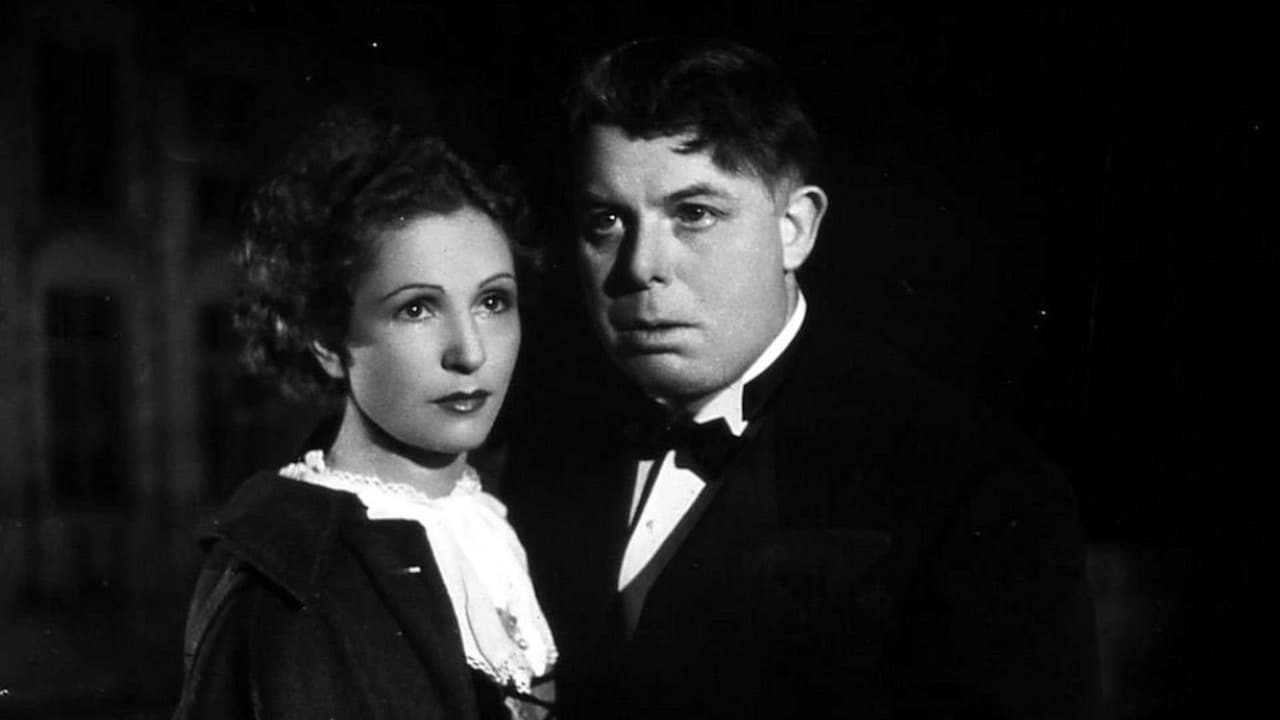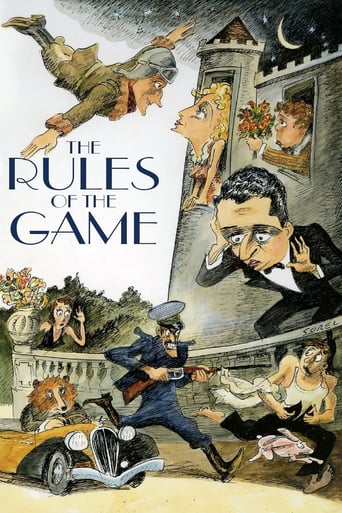



Sadly Over-hyped
Purely Joyful Movie!
An action-packed slog
The film's masterful storytelling did its job. The message was clear. No need to overdo.
View MoreA fan of the dazzling Film Noir La Bête Humaine,I was thrilled when my dad gave me auteur Jean Renoir's The Rules of the Game for my birthday,which I decided to save for a special viewing. Learning of an ICM poll taking place for the best films of 1939,I decided that this was the perfect time to play the game.The plot:Getting out of his plane, aviator André Jurieux learns from his friend Octave that lover Christine de la Cheyniest has not come along to greet him. Hearing Jurieux makes this statement as she is cared for by maid Lisette, Christine affair with Jurieux is joined by her husband Robert having secret mistress Geneviève,and Lisette being more devoted to Christine than her husband Schumacher (who works as gamekeeper on the Cheyniest estate.) Planning just to invite Geneviève to stay at the estate over the weekend so he can end the affair, Robert ends up getting pulled to invite André, Octave and Christine to the estate! All meeting up at the estate,the rules of the games in their relationships start to get played.View on the film:Carrying the title of being one of the greatest films ever made, co- writer/(with Carl Koch) co-star/producer/ directing auteur Jean Renoir (whose son Alain Renoir was one of the cinematographers)gives the film a surprisingly lively atmosphere,with lavish tracking shots spanning the closed-off bourgeois lifestyle. For what was then the most expensive French film of all time,Renoir puts every penny on screen,with a rich depth of field vision highlighting how detached the guests are from the oncoming shadow of WWII. Never openly mentioning WWII, (which did not stop the movie from getting banned for "Demoralising" the public) Renoir casts an atmosphere of anxiety across the entire film,from a soulless hunting party shown by the camera running over the grounds as if they are a battlefield,to a chillingly covered in shadows being unable to hide the emotionless state the guests have towards death and murder.Starting the writing with the play Les Caprices de Marianne a major influence in the background, the screenplay by Renoir and Koch retains stage origins in the dialogue having the smoothness of a Comedy stage play that has turned sour,as the razor sharp punch- lines are turned into arrows dissecting the bourgeois life. Only writing a third of the screenplay fully (with the rest being a detailed outline that allowed the cast to come up with their own dialogue)the writers and cast mercilessly tear apart the dying days of the bourgeois, in the coiled state that all the characters only care about their own affairs, leaves disruption from the outside world being something they can all dismiss out of hand.Taking the role after Pierre Renoir had to leave to work on stage and Michel Simon was unable to find a gap from his projects lined up, Jean Renoir gives a marvellous performance as Octave,with a welcoming manner Renoir uses to capture the wickedly satirical mood of the piece. The woman of every man (and woman's) dream on the estate, Nora Gregor (who sadly died age 47 in 1949) gives a magnetic performance as Christine,whose masculinity Gregor uses to make Christine the dominate bourgeois on the estate,as the games begin.
View MoreThe film could be said to be a critique of the upper class during pre-war times as the characters remain ignorant about the world around them while facing issues of adultery rather than destruction.Putting the ideology aside, this film had a lot of talking, and almost every scene is hectic. It is quite a lot to take in, and the story is pretty complex with relationships being very fragile and interchangeable. The characters move about very often, and this adds to the 'business' feel of the film. To complement that, the camera often pans with the addition of some fast paced cutting in scenes.The acting is good, but there are times where it feels like overacting. Plus, the film does not give us a protagonist, and we don't really get emotionally involved with any of the characters. That is perhaps what makes this film quite hard to digest, as there is no particular person the audience can identify with.Overall, it was quite bearable with some comedic scenes, and definitely more enjoyable than some other films I have had to watch for my film studies courses.Read more movie reviews at: championangels.wordpress.com
View MoreThe movie takes the superficial form of a country house farce, at which wives and husbands, lovers and adulterers, masters and servants, sneak down hallways, pop up in each other's bedrooms and pretend that they are all proper representatives of a well-ordered society.All of this comes to a climax in the famous sequence of the house party, which includes an amateur stage performance put on for the entertainment of guests and neighbors. This sequence can be viewed time and again, to appreciate how gracefully Renoir moves from audience to stage to backstage to rooms and corridors elsewhere in the house, effortlessly advancing half a dozen courses of action, so that at one point during a moment of foreground drama a door in the background opens and we see the latest development in another relationship. It is interesting how little actual sexual passion is expressed in the movie. Schumacher the gamekeeper is eager to exercise his marital duties, but Lisette cannot stand his touch and prefers for him to stay in the country while she stays in town as Christine's maid. The aviator's love for Christine is entirely in his mind. The poacher Marceau would rather chase Lisette than catch her. Robert and his mistress Genevieve savor the act of illicit meetings more than anything they might actually do at them.It is indeed all a game, in which you may have a lover if you respect your spouse and do not make the mistake of taking romance seriously. The destinies of the gamekeeper and the aviator come together because they both labor under the illusion that they are sincere.The finished shot, ending with Robert's face, is a study in complexity, and Renoir says it may be the best shot he ever filmed. It captures the buried theme of the film: That on the brink of war they know what gives them joy but play at denying it, while the world around them is closing down joy, play and denial.
View MoreGreetings again from the darkness. What a thrill to see both of director Jean Renoir's masterpieces on the big screen within a couple of weeks of each other. The other is Grand Illusion and the two could not be less similar. In this film, Renoir presents a farcical display of societal "rules" of the time, and even draws a parallel between the upper crust and working class when it comes to love and lust.The film was not well received upon its initial release because, times being as they were, very few enjoyed laughing at themselves. The film was seized by both the French government and later the Nazi's. Both labeled the film dangerous to society. The original negatives of the film were destroyed and film was pieced back together in the 1950's and now, with technical advancements, we get to watch a beautiful print as Renoir intended. Today, however, it is quite fun to see how Renoir was poking and prodding and very precise with his aim.The story begins with the heroic landing of French aviator Andre Jurieux (Roland Toutain) after his solo trans-Atlantic flight. Once you realize this is 10 years after Lindbergh's flight, you start to understand why the French were not pleased with the film. To make it worse, Jurieux acts like a teenager as he pouts in public when he realizes the woman he loves didn't come to welcome him home. Nevermind that Christine (Nora Gregor) is married! Circumstances bring many to the country estate of Christine and her husband Robert de la Chesnaye (Marcel Dalio) for a hunting expedition. What we actually have is a gathering of wives, husbands, mistresses, lovers, house servants, and French ruling class in a tangled web that obviously influenced Robert Altman for his classic Gosford Park. Robert's mistress (Mila Parely) is there and though Robert has promised Christine the affair is over, a wonderful scene finds her lowering binoculars to spot the two kissing in the distant. This leads Christine to be a more open to the advances of Andre the aviator.To bring in a bit more fun and action, we see the working class mirror the actions of their bosses. Lisette (Paulette Dubost) is married to the gamekeeper Schumaker (Gaston Modot) who doesn't take kindly to poacher Marceau (Julien Carette) making advances on Lisette. During the shenanigan's, Octave (Jean Renoir himself) alternates as both an entertaining clown and peace-keeper to ensure that he is continued to be welcome into Robert's home. He is a bit of a hanger-on.There is no plot per se, though we do get a surprise, erroneous murder, and that event brings even more unclear thinking to the group. The key to the film is the wonderful direction of Renoir. So much is going on simultaneously that your eyes must stay sharp and alert. Few directors of the time used such depth in the action ... pay attention to the foreground and background or you'll miss something! My favorite scene is when Robert unveils his latest find - a mechanical musical gadget that runs on precision. It's in stark contrast to the party and the lives of these people.
View More